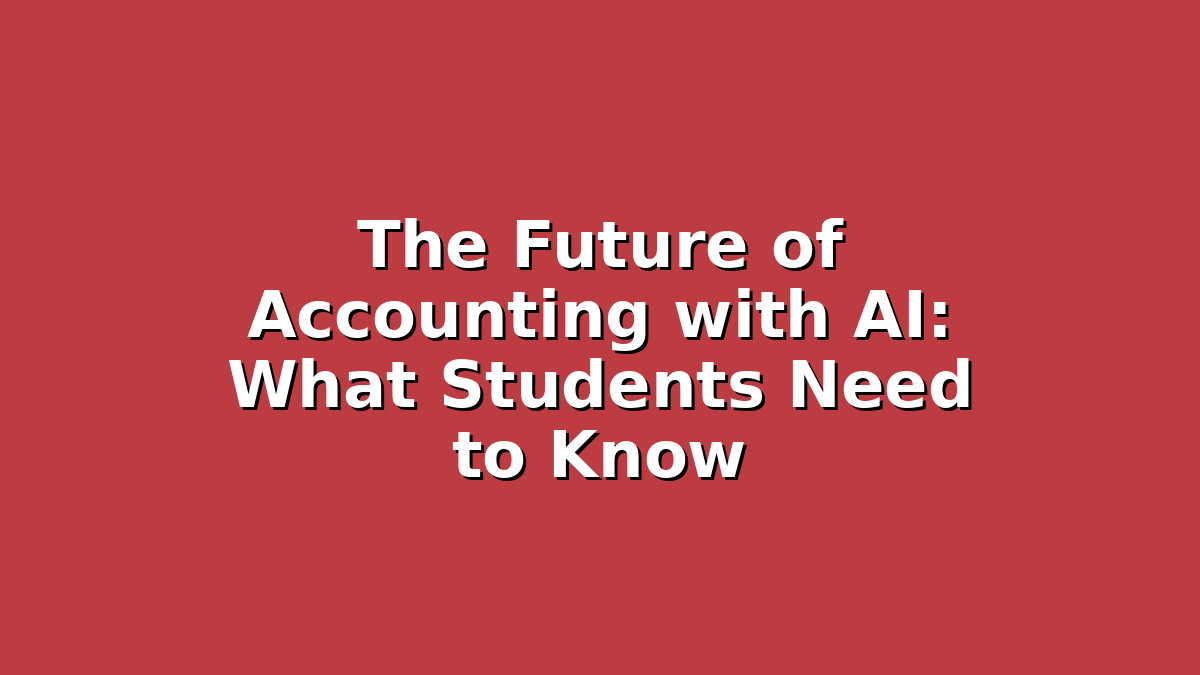As a student preparing for accounting exams or simply aiming to excel in your studies, you might be wondering how the field of accounting is evolving in the modern world. One of the most significant changes shaping the future of accounting is the rise of Artificial Intelligence (AI). AI is transforming how accountants work, making tasks faster, more accurate, and often more strategic. Understanding this shift not only prepares you for your future career but can also help you refine your study techniques to stay ahead.
In this article, we will explore the future of accounting with AI and provide practical study tips tailored for students. By the end, you’ll have a clearer picture of what lies ahead and how to best prepare yourself for exam success and a thriving career.
1. How AI is Changing Accounting: What Students Should Know
Artificial Intelligence is no longer a futuristic concept—it’s actively reshaping accounting practices today. AI technologies like machine learning, natural language processing, and robotic process automation are automating routine tasks such as data entry, invoice processing, and financial reconciliations. This shift means that accountants are moving away from manual, repetitive work and focusing more on analysis, strategy, and decision-making.
Why is this important for you as a student?
Understanding how AI is used in accounting will help you grasp exam concepts related to technology in accounting and prepare you for questions about emerging trends. It’s also a chance to develop relevant skills that employers value.
Study tip:
When studying topics like auditing, financial reporting, or management accounting, try to include examples of how AI tools can assist in these areas. For instance, think about how AI-powered auditing software can detect anomalies in financial statements more efficiently than manual checks. Incorporate these examples into your notes and essays to demonstrate deeper understanding.
—
2. Mastering Technical Skills and Soft Skills for the AI-Driven Accounting World
As AI takes over routine accounting tasks, the role of accountants is evolving into one that requires both technical proficiency and strong soft skills. For students, this means your study plan should extend beyond just learning accounting principles.
Technical skills to focus on:
– Data analytics: AI generates vast amounts of data. Knowing how to interpret this information is crucial. Consider learning basic data analysis tools like Excel advanced functions, SQL, or introductory programming languages like Python.
– Familiarity with AI tools: Explore popular accounting software that integrates AI, such as QuickBooks, Xero, or SAP. Many of these platforms offer trial versions or student resources. Even a basic understanding can give you a competitive edge.
Soft skills to develop:
– Critical thinking: AI can provide data and insights, but interpreting and making decisions based on that information is a human skill. Practice solving case studies or exam questions that require judgment and analytical thinking.
– Communication: Future accountants will often present AI-generated reports to clients or management. Work on explaining complex information clearly and concisely, a useful skill for both exams and careers.
– Adaptability: AI technology is constantly evolving. Cultivate a mindset of continuous learning by staying curious and adaptable, which will help you adjust to new tools and methods over time.
Study tip:
Dedicate specific study sessions to developing these complementary skills. Join study groups or online forums where you can discuss how AI affects accounting, or practice explaining accounting concepts aloud to improve your communication abilities.
—
3. Effective Study Strategies to Keep Up with AI Trends in Accounting
Accounting exams often focus on traditional principles, but incorporating knowledge about AI and technology can make your responses stand out. Here are some strategies to help you stay current and study effectively:
Stay informed with reputable resources:
Follow websites, blogs, and journals that focus on accounting technology and AI. Examples include the AICPA’s Technology Resources, Accounting Today, or specialized LinkedIn groups. Even dedicating 10-15 minutes per day to reading articles or watching videos can keep you updated.
Integrate AI examples into your study materials:
When reviewing textbook concepts, make notes or flashcards that include how AI applies. For example, if you’re studying fraud detection, include how AI algorithms help identify suspicious transactions faster than humans. This approach deepens your understanding and prepares you for application-based exam questions.
Practice with real-world applications:
Look for case studies or exam questions that focus on AI in accounting. If your syllabus includes technology topics, create practice essays or presentations that link theory with AI advances. This will improve your ability to analyze and articulate how AI impacts accounting processes.
Use AI tools to boost your own learning:
Leverage AI-powered study aids like quiz generators, flashcard apps, or writing assistants to enhance your revision. Tools such as Quizlet or Grammarly can make your study sessions more interactive and efficient.
Study tip:
Set SMART (Specific, Measurable, Achievable, Relevant, Time-bound) goals that include learning about AI’s role in accounting. For example, aim to summarize one AI-related article per week or complete one practice essay incorporating AI concepts before your exam.
—
Conclusion: Embrace AI as a Partner in Your Accounting Journey
The future of accounting with AI is bright and full of opportunities—especially for students willing to embrace change. AI will not replace accountants but empower them to be more strategic, insightful, and efficient. By understanding AI’s impact, broadening your skill set, and adopting smart study habits, you’ll not only prepare yourself for exams but also set a strong foundation for your future career.
Remember, the key is to stay curious, practice consistently, and integrate AI knowledge into your learning. With the right mindset and tools, you can confidently navigate the evolving landscape of accounting and excel both academically and professionally.
Keep pushing forward, and good luck with your studies!

Responses